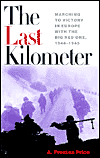

 |

|

The average rating for The Last Kilometer: Marching to Victory in Europe with the Big Red One, 1944-1945 based on 2 reviews is 4 stars.
Review # 1 was written on 2012-12-24 00:00:00 Michael Ranney Michael RanneySolid and well-written. |
Review # 2 was written on 2021-02-14 00:00:00 Tim Beaty Tim BeatyThis book is not an easy read. It was written in the 1950s and is a scholarly work. That said it is not difficult to read, just slow if you want to think about what is packed into this book. John Wesley Powell gained fame as the first man to run the Colorado River through the Grand Canyon. He was so much more than that. His career spanned the late 1860s when he mapped the Colorado region to 1894 when some Senators finally pushed him out of his work with the U. S. Geological Survey (USGS) and Irrigation Survey. Powell grew up much as John Muir did and gained an education in much the same manner. Both men had itchy feet and went off exploring. Powell loved the Plateau area of the West. He was concerned that people thought it was something it wasn't and their mistaken ideas too often ended in tragedy. His career was centered on trying to give people a better understanding of the arid regions beyond the hundredth meridian. Central to Powell's plan was the topographical mapping of the entire U.S. This was still only 60% done in 1952! Yet, his influence did create the USGS and set it on a course to map the country. A major concern was that the country had formed its ideas and beliefs about farming in the eastern part of the country where rainfall was enough to make farming profitable. The land laws were written for this type of farming. A school of thought promoted the idea rain followed the plow so all homesteaders had to do was stake a claim and put in a crop. During the wet years in the 1870s this worked. Then came the dry decades preceded by a terrible winter leaving people frozen in their homes, cattle frozen by the hundreds in their pastures. And over 90% of homesteaders failed sometimes fatally. There was even a dust bowl in the 1890s. I highly recommend this book. It takes a good hard look at why western policies are the way they are, where the water wars came from and how politics can both help or destroy the solutions. Those western myths and legends are hard to deal with but must be understood for what they are before a solution to the arid west can be found and implemented. With the west becoming even drier and the population growing, these questions must be faced and do affect the entire country. |
CAN'T FIND WHAT YOU'RE LOOKING FOR? CLICK HERE!!!